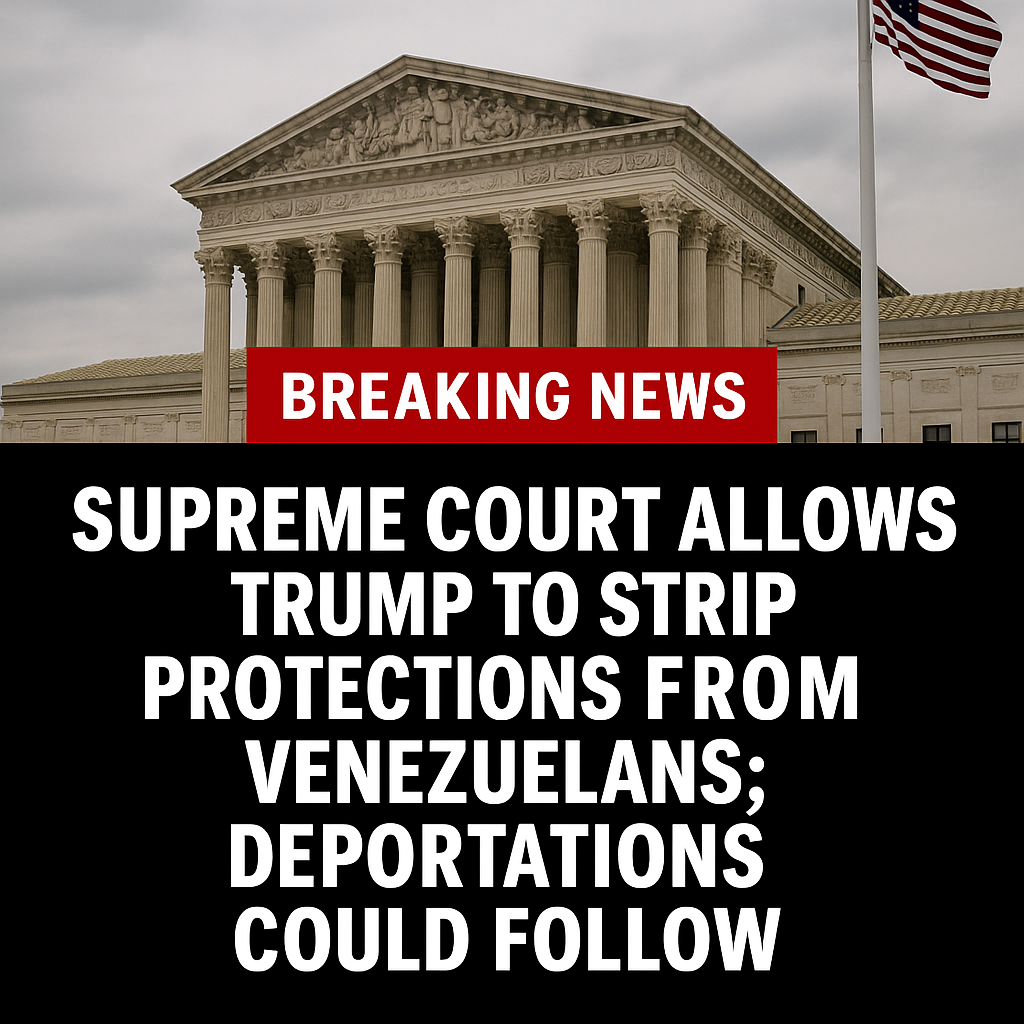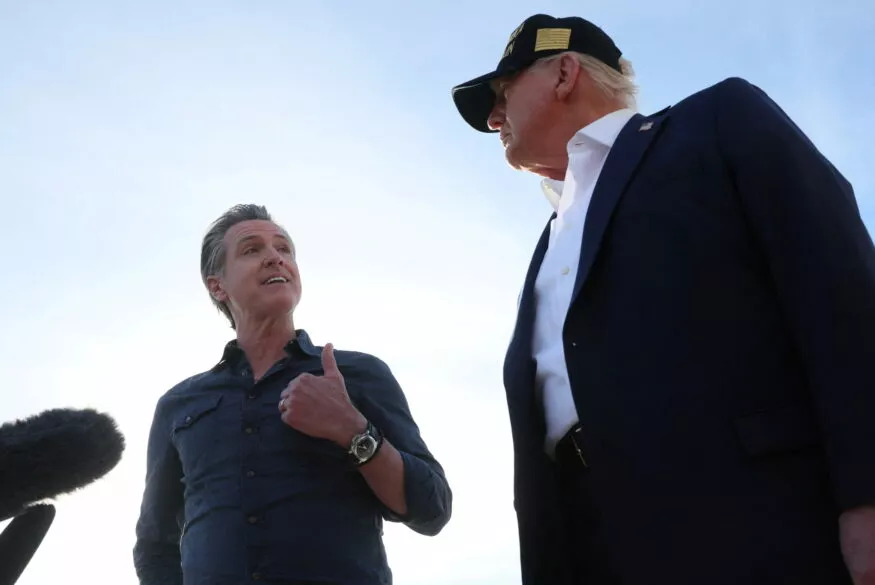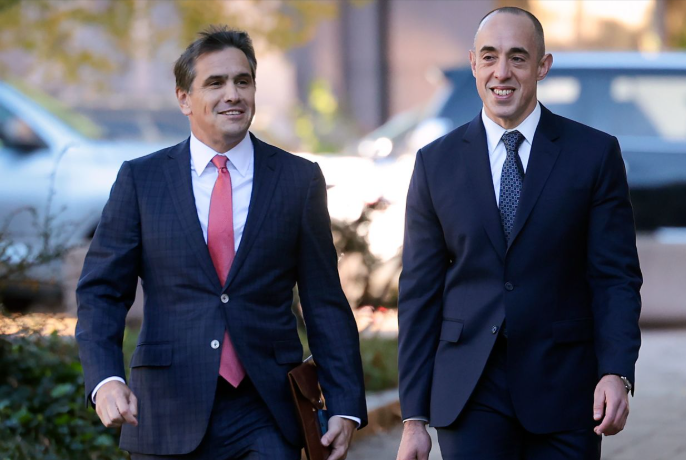On May 19, 2025, the U.S. Supreme Court issued a pivotal decision allowing the Trump administration to rescind Temporary Protected Status (TPS) for approximately 350,000 Venezuelan migrants, potentially exposing them to deportation.
This ruling lifts a previous injunction by a federal judge in San Francisco that had maintained TPS protections, which were initially extended by the Biden administration until October 2025 due to Venezuela’s ongoing humanitarian crisis.
BREAKING: U.S. Supreme Court allows the Trump administration to revoke temporary legal status protections for more than 300,000 Venezuelan migrants as litigation continues
The order is 8-1, with Justice Jackson the lone dissenter. pic.twitter.com/swOdfZ9khv
— Jacob Wheeler (@JWheelertv) May 19, 2025
TPS is a humanitarian program established in 1990, designed to offer temporary legal status and work permits to individuals from countries experiencing extraordinary conditions such as armed conflict or natural disasters. Under President Biden, TPS was extended to Venezuelans in response to the country’s economic collapse and political turmoil.
Dale L. Wilcox, Executive Director and General Counsel for the Immigration Reform Law Institute, had a reality check for everyone still clinging to the idea that the President of the United States can’t control immigration.
In his words:
“The Supreme Court has repeatedly recognized the President’s inherent authority to exclude aliens, and ‘inherent’ clearly means he may exercise it even when he is not guided by a specific statute.”
Finally! @SCOTUS delivers a big win for sanity! “This is the largest single action stripping any group of non-citizens of immigration status in modern U.S. history. says Ahilan Arulanantham, who is representing illegal immigrants from Venezuela. https://t.co/eqy4irT3JH
— Washington State GOP (@WAGOP) May 19, 2025
In February 2025, Homeland Security Secretary Kristi Noem announced the termination of TPS for Venezuelans, citing national security concerns. This decision was challenged in court, with plaintiffs arguing that the revocation was based on negative stereotypes and lacked a lawful basis. District Judge Edward Chen sided with the plaintiffs, issuing a temporary restraining order to halt the administration’s actions.
The Supreme Court’s recent decision, delivered without a detailed opinion, effectively lifts Judge Chen’s injunction, allowing the administration to proceed with the termination of TPS for Venezuelans. Justice Ketanji Brown Jackson was the sole dissenter in the ruling.
This development has sparked significant concern among immigrant advocacy groups and human rights organizations. Critics argue that returning Venezuelans to a country still grappling with severe economic and political instability could endanger lives and exacerbate the humanitarian crisis. The State Department continues to advise against travel to Venezuela due to safety risks.
The Trump administration maintains that the decision to end TPS for Venezuelans is a necessary measure to uphold immigration laws and protect national security. Officials argue that the conditions in Venezuela have improved sufficiently to warrant the termination of TPS, a claim disputed by many international observers and human rights organizations.
Legal experts note that while the Supreme Court’s ruling allows the administration to proceed with the termination of TPS, it does not preclude further legal challenges. The case will continue to be reviewed by the Ninth Circuit Court of Appeals, and additional lawsuits may arise as the situation develops.
The decision also raises broader questions about the scope of executive authority in immigration matters and the role of the judiciary in overseeing such decisions. Some legal scholars express concern that the ruling could set a precedent for future administrations to unilaterally alter or terminate humanitarian protections without comprehensive judicial review.Vox
For the Venezuelan community in the United States, the ruling introduces a period of uncertainty and anxiety. Many TPS holders have established deep roots in the country, contributing to the economy and society. The potential loss of legal status and the threat of deportation pose significant challenges for these individuals and their families.
In response to the ruling, advocacy groups are mobilizing to provide legal assistance and support to affected individuals. Efforts are underway to lobby Congress for legislative solutions that would offer permanent residency or other forms of relief to long-term TPS holders.
The international community is also closely monitoring the situation, with some governments and organizations expressing concern over the potential human rights implications of mass deportations to Venezuela. Calls for diplomatic engagement and humanitarian considerations are growing as the U.S. moves forward with its plans.
As the legal and political battles continue, the fate of hundreds of thousands of Venezuelans in the United States hangs in the balance. The Supreme Court’s decision marks a significant moment in the ongoing debate over immigration policy, executive power, and the nation’s commitment to humanitarian principles.






